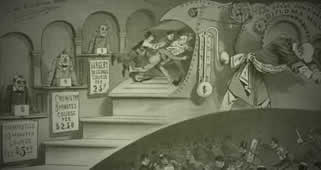
Creating Standards
1915-1949
Coinciding with a period of great reforms in medical education and licensure, the NBME was founded in 1915 to establish an examination of such high character that successful candidates could safely be admitted to the practice of medicine by all state boards without further examination.
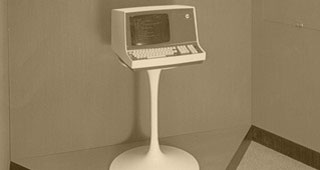
The Science of Testing
1950-1989
After several years of study, the essay exam format was replaced by the more objective multiple-choice question format in Parts I and II. Exam results became more useful in evaluation of medical educational programs.
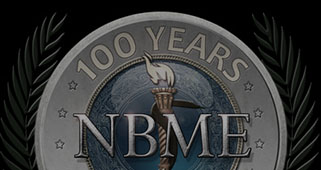
The National Board Today
1990-2015
The introduction of computer-based testing and the implementation of the USMLE, including a test of clinical skills, were hallmarks of this era. NBME’s collaborative relations grew along with international initiatives.
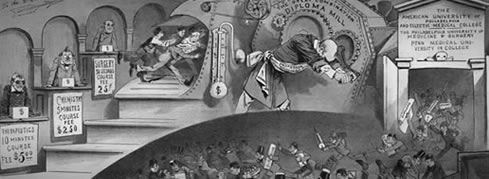
Coinciding with a period of great reforms in medical education and licensure, the NBME was founded in 1915 to establish an examination of such high quality that successful candidates could safely be admitted to the practice of medicine by all state boards without further examination.

The NBME is deeply indebted to the organizations shown below for their early financial support and encouragement.
This organization helped fund the study, design and implementation of the three-part examination implemented in 1922.
In 1921, a generous grant from this organization enabled the Board to expand its program and facilities to meeting growing demands and new opportunities.
The FSMB supported the formation of the NBME. Dr. Herbert Harlan represented the FSMB as a founding member of the NBME.
This organization helped fund the study, design and implementation of the three-part examination implemented in 1922.
This foundation’s General Education Board provided over $100,000 in grant funds to support the NBME’s work from 1925-1933. The foundation also helped fund the study, design and implementation of the three-part examination implemented in 1922.
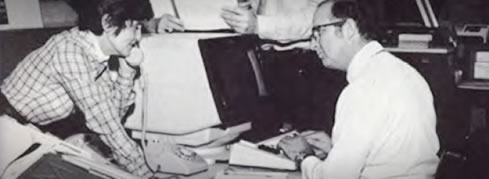
After several years of study, the essay exam format was replaced by the more objective multiple-choice question format in Parts I and II. Exam results become more useful in evaluation of medical educational programs.

As objective testing gained wider acceptance, medical schools asked NBME to make examinations available for evaluation of entire student classes. Subject tests (“shelf exams”) were drawn from Parts I and II and used as end-of-course evaluations. NBME expertise was called on to develop examinations for other organizations (e.g., ECFMG, FSMB), and services were provided to other health professional organizations in developing their certifying, in-training, and self-assessment exams.
Foundation Support
From 1950-1989, the NBME received generous support from the following philanthropic organizations:
- The Commonwealth Fund
- The Carnegie Corporation
- W.T. Grant Foundation
- Henry J. Kaiser Family Foundation
- W.K. Kellogg Foundation
- John and Mary R. Markle Foundation
- Charles E. Merrill Trust
- Pew Memorial Trust
- The Rockefeller Foundation
- Robert Wood Johnson Foundation
In the 1970s, the NBME and AAMC collaborated on the Coordinated Transfer Application System (COTRANS) for American medical students studying abroad who wanted to complete their studies at an accredited U.S. medical school. In 1980, in consultation with AAMC, NBME developed the Medical Sciences Knowledge Profile (MSKP) to aid the assessment of medical knowledge of medical students studying overseas who wished to transfer with advanced placement to AAMC constituent schools.
Beginning in 1958, exams derived from Parts I and II item pools were developed for use by the Educational Council (later Commission) for Foreign Medical Graduates (ECFMG) in its certification program. In 1984, NBME and ECFMG agreed to discontinue their separate examination programs (i.e., NBME’s Visa Qualifying Exam and ECFMG’s exam) for foreign medical graduates and implemented the Foreign Medical Graduate Examination in Medical Sciences (FMGEMS). In 1988, under the sponsorship of the ECFMG, FSMB and NBME, a coalition was convened to consider the concept of a single examination for medical licensure, leading to publication, in March 1989, of the Proposal for a Single Examination for Medical Licensure.
From 1950-1953, with the financial support of the Markle Foundation, NBME and ETS undertook a long-range study of the comparative values of multiple-choice and essay tests. At that time, ETS was responsible for the Medical College Admission Test and was well known in the field of medical education. Based on results of the study, in 1954 NBME discontinued the use of essay tests in Parts I and II and implemented multiple-choice testing.
In 1969, in cooperation with and as a service to the FSMB, NBME developed the Federation Licensing Examination (FLEX), derived from NBME examination materials. FLEX was offered to every state licensing authority under the sponsorship of FSMB. Over time, licensing authorities called for a redesign of FLEX that would not be linked to the NBME Part examinations and would be designed specifically to assess capabilities of graduating physicians to provide safe and effective patient care. The first administration of the new FLEX was in June 1985. In 1988, FSMB and NBME jointly introduced the Special Purpose Examination (SPEX), an objective, standardized cognitive exam of current knowledge requisite for the general, undifferentiated practice of medicine.
In 1961, NBME developed its first formal relationship with a specialty board, The American Board of Pediatrics. Other specialty boards soon followed, including the American Board of Internal Medicine, American Board of Neurological Surgery, and American Board of Family Practice. Examination purposes included certification, recertification, in-training and self-assessments. Typically, in its work with specialty boards, NBME provided consultative, professional and administrative services, while the specialty board had responsibility for test design, development and use. In 1972, with encouragement from the AMA, NBME agreed to provide the leadership and expertise necessary to develop a certifying examination for a new category of health professional, the assistant to the primary care physician. In 1973, the first national certifying exam for physician assistants was administered.
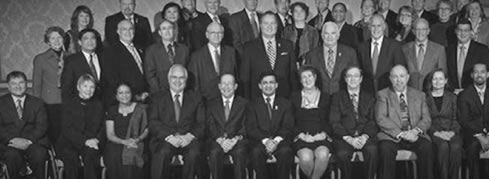
The introduction of computer-based testing and the implementation of the USMLE, including a test of clinical skills, are hallmarks of this era. NBME’s collaborative relations grew along with international initiatives.

The decision of the FSMB and NBME to discontinue their examination programs and implement the USMLE as a single pathway for medical licensure marked the beginning of this collaborative era. Later, ECFMG and NBME partnered to form the Clinical Skills Evaluation Collaboration to introduce a test of clinical skills into the USMLE examination sequence. With the implementation of computer-based testing, USMLE Step administrations went from twice per year per Step to continuous year-round testing. In the early 2000s, a more formalized approach to international collaborations was developed.
With the 2001 decision of the NBME and the Federation of State Medical Boards (FSMB) to implement a clinical skills examination as part of USMLE, it became clear that a partnership with the Educational Commission for Foreign Medical Graduates (ECFMG), which had developed and implemented a clinical skills examination as part of its certification program in 1998, would optimize both the speed and efficiency with which the USMLE clinical skills examination could be implemented. An agreement creating CSEC was signed by ECFMG and NBME in 2003. ECFMG has had responsibility for building the test centers and for managing operations at the test center, including hiring center staff and standardized patients and scheduling. The NBME has primary responsibility for test development, scoring, and quality assurance. The two organizations share equally in tasks related to technology infrastructure.
The Data Commons, LLC is a joint partnership among the American Board of Pediatrics, American Board of Family Medicine, Association of American Medical Colleges, Educational Commission for Foreign Medical Graduates, Federation of State Medical Boards and NBME. This information-sharing system allows participating organizations to make selected information from their individual databases available via a shared data hub. Data Commons became operational in 2013.
In March 2014, the NBME and NBVME signed an agreement establishing a partnership for the development and delivery of the North American Veterinary Licensing Examination (NAVLE). NBME had worked with NBVME for many years as a vendor, providing services to support the NAVLE. The collaboration provides a new model for partnering with examination sponsors to bring NBME’s expertise to bear on examination programs with a longer term commitment than typically provided in client-vendor relationships.
In 2014, the Association of American Medical Colleges and the NBME launched the Pivio™ system, an online, lifelong learning and career documentation tool designed to help individuals document and track their medical education and experiential information throughout the continuum of their career—from pre-medical studies through clinical practice.
PLAS is a joint activity of the NBME and the FSMB. PLAS comprises two programs: the Special Purpose Examination (SPEX) Program and the Assessment Center Program (ACP). SPEX is a one-day, multiple-choice examination of current knowledge requisite for the general, undifferentiated practice of medicine and is intended to be used for reasons of endorsement or reciprocity of licensure. The ACP provides comprehensive, objective, and personalized assessments of physicians for whom there is a question regarding clinical competence.
After more than 75 years of providing independent certification of competence for licensure, in 1992 the NBME established, in partnership with the FSMB, the USMLE. This new program merged the NBME Certifying Examinations and the Federation Licensing Examination (FLEX) and replaced the various exams that had been used to assess qualifications of foreign-trained physicians for entry into US postgraduate medical education. ECFMG participates in USMLE through a contract with the USMLE parent organizations and nominates three representatives to the USMLE governing committee (Composite Committee). ECFMG uses Steps 1 and 2 as requirements for its certification. The ECFMG provides examinee services, including information provision, registration, fee processing, and score reporting for international medical students and graduates.
